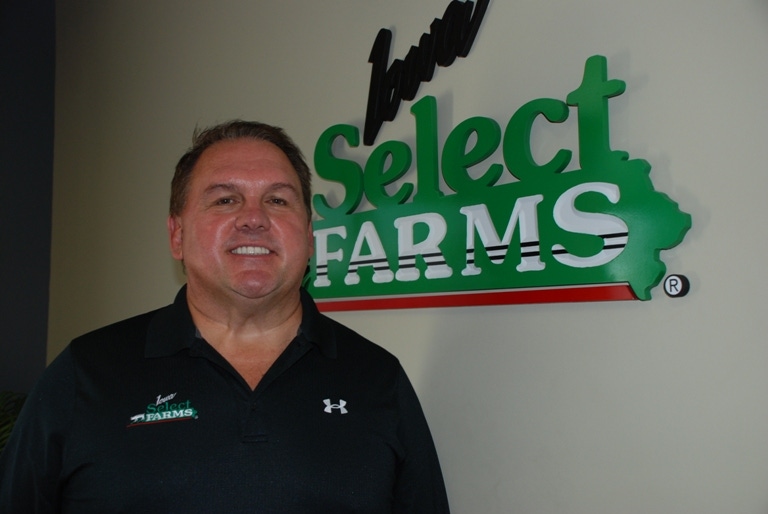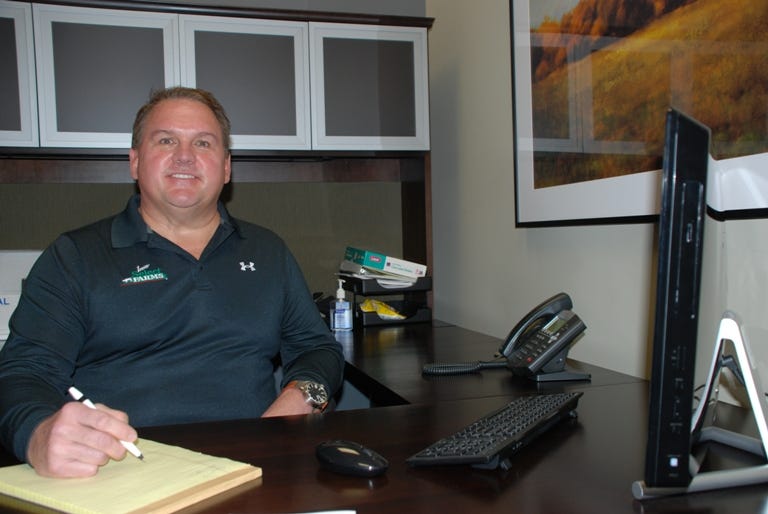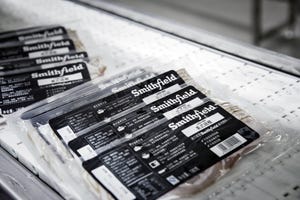With no formal business training, this entrepreneur made his way through sheer determination.
May 15, 2013

An education in the hog business can take many forms. For Jeff Hansen, founder and CEO of Iowa Select Farms, the tutorial began at the end of a pitchfork. Growing up on a farm near the company’s home base in Iowa Falls, IA, Hansen and his two brothers were what he calls “Dad’s skid-steer loaders.”
Laurence Hansen bought several acreages in the area with old barns and cattle sheds, and filled them with feeder pigs. “Our job was to rotate from acreage to acreage to clean those barns,” Jeff Hansen explains. “As I pitched manure from those sheds and barns, I thought to myself — there’s got to be a better way!”
Fresh out of high school in 1976, Hansen decided to forego college, got married and began working for his father. His wife, Deb, worked in a nearby Farm Bureau Insurance office. Her parents owned a carpet-vinyl flooring business, so he pitched in to make a few extra dollars.
Looking to supplement their income further, Hansen asked his father if he could convert one of the old barns for farrowing. He bought three sows, some used farrowing crates for $35 apiece and was on his way.
Within three years, the sow herd had grown to 150 sows, and Deb Hansen had quit her job to manage the farrowing house. The sows were turned out morning and evening for feed and water, and crates were hand-scraped. Feeder pigs were sold to Hansen’s father.
“That worked for a while, but one day Deb came to me and said: ‘Those sows are mean; they are too aggressive and the labor is wearing me out. This job has become a little overwhelming!’ ”
Thumbing through a magazine, Hansen found a solution: elevated farrowing crates with steel slats, a feed pan and automatic waterers. He contacted the company, placed an order and asked to become a dealer. “I had a hunch there were other farmers with the same issues, so why not find ways to help them, too?” he notes.
Ever the salesman, Hansen placed ads in area magazines and local newspapers announcing a hog equipment open house in his garage. “People started coming at 8 o’clock in the morning and the last left about 11 o’clock at night,” he remembers.
His business grew rapidly, but problems with the crate’s design began to surface. When the manufacturer refused to make changes, Hansen launched plans for his own steel fabrication shop to build farrowing crates, nursery decks, feeders, gating and other livestock equipment.
Modern Hog Concepts
In 1979, just three years out of high school, Hansen approached a local banker for an operating loan. “Dick Miller gave me the biggest break in the world,” he says. “I told him I had rented a building and we were going to sell livestock equipment. I had no money and no credit record, but he believed in me and my story.”
By 1981, the company, Modern Hog Concepts, had outgrown the rented property and construction of a new facility was under way. As the company grew, Hansen’s hunch that other producers were looking for less labor-intensive methods proved correct. He remembers setting a personal sales goal of selling $1 million worth of livestock equipment in a year. His sow herd began to shrink.
The farm crisis took hold in the early ’80s, and by the middle of the decade times got very tough for pork producers and steel fabricators. But Hansen had built solid relationships with various construction companies, whose sales staffs often referred their clients to Hansen for equipment.
In 1983, Hansen became a Lester’s Buildings dealer, which enabled him to build a turnkey production system, start to finish. By the early 1990s, Hansen had not only met the sales goal he had set a decade earlier, he far exceeded it with sales reaching $90 million annually.
Later, the company developed its own turnkey construction business in partnership with Energy Panel Structures (EPS). The company continues to operate under the name New Modern Concepts.
Pork Industry Regroups
As the farm crisis waned, growth in hog production began again. Only this time, instead of remodels, new, more expansive confinement facilities were being planned and built.
During various construction projects around the country, Hansen kept his eye on what was happening in North Carolina. At the same time, consumers were demanding leaner pork, and it was clear that these larger, integrated models could deliver the consistency, quality and leanness their customers wanted.
“At that point, there were two things I knew for sure — Iowa was best suited to build an integrated pork production system and, second, I knew I could figure out how to do it,” he explains.
Furthermore, Hansen knew he needed to find a packer contract to support his risk management plan. It wasn’t long before he obtained a contract with Farmland Foods for the hogs produced from 10,000 sows. He was off and running.
Starting from Scratch
“Being so deep in the equipment and construction side, we saw all kinds of facilities and different ideas. Different people had different ideas about what they thought a hog operation should look like,” Hansen relates.
He purchased a farm north of Iowa Falls and began planning his first 4,100-sow operation. “I figured if I was going to get back in, I wanted to spread the costs and efficiencies, the labor costs across more sows,” he notes. “We designed it with a pull-plug system, recharged with water from lagoons — new technology for this part of the country.”
On May 14, 1993, Iowa Select Farms farrowed its first litter of pigs in a leased facility while two sow farms were under construction. That spring and summer, 100-year rains devastated the corn crop but, thankfully, Hansen had hedged his corn needs. And there was more severe weather to come. A tornado demolished the farrowing barns at the second sow farm just weeks before the first litters were due.
Like what you’re reading? Subscribe to the National Hog Farmer Weekly Wrap Up newsletter and get the latest news delivered right to your inbox every Friday!
“We were off to a rocky start,” Hansen remembers. “But everyone came together to clean up and rebuild in time to welcome those first litters. Many of those employees are still with us today, some in production leadership roles. I owe them a lot.”
Risk management was critical to Iowa Select Farms’ strategy from the start. “I’m a risk-averse person, so we were really keen on that right from the start,” he says. “There are many ways to manage risk — hedging corn and soybean meal, hedging hogs, additional financing, tightening up our operations. We did everything we could to weather the storm.”
Iowa Select Farms’ growth continued. By 1998, the sow herd had grown to 88,000 head on 22 farms, with a labor force of 791 employees.
Then in late 1998, “the wheels came off,” he recalls. “I stopped to look at the sheer number of families counting on us — employees, contractors, local businesses we worked with. It was eye-opening. It wasn’t just Deb and I talking about building better farrowing crates anymore,” he says.
Neighbor Relations
Of all of the challenges faced during their growth, Hansen says those that surprised him most were the environmental issues raised and the “social backlash” from neighbors.
“I had no idea,” he proclaims. “We have always tried to address every issue as we went into it — always trying to do the right thing, work with the neighbors, always building state-of-the-art facilities. That worked most of the time, but at others it was a big struggle,” he says.
Hansen was the first producer in the nation to establish a Lagoon Assurance Program after a major manure release was discovered at the farm of another Iowa producer. The field tile nearby the lagoon had not been removed or capped, which allowed most of the manure in the structure to drain away.
Hansen was determined to make sure Iowa Select Farms’ manure storage facilities were safe. He met with his nutrient management team the next morning to develop a written protocol to deal with potential tile lines around manure storage structures. The protocol called for an 8-ft.-deep by 2-ft.-wide exploratory trench to be dug around the entire perimeter of a storage structure, and for any tile lines encountered to be completely removed to a safe distance and then capped with cement. The protocol was faxed to the Iowa Department of Natural Resources (DNR) and approved that same day.
In 1997, Iowa Select Farms was the first Iowa pork producer to be recognized with the National Environmental Stewardship Award, co-sponsored by National Hog Farmer and the National Pork Board, for their innovative farm design, manure management and for taking proactive measures to protect the environment.
Iowa Select Farms currently ranks sixth in the nation, with 168,000 sows, with pigs raised on over 550 farms, including almost 350 contract producer farms. All but one farm is located in Iowa. The employee count now stands near 1,000.

Iowa Only
“We made a strategic decision to focus our production on Iowa only,” Hansen explains. “Obviously, it’s advantageous from a corn and manure utilization standpoint, but it is also because of the strong rural communities throughout the state, supported by the expertise and resources of Iowa State University.”
Hansen admits that locating sows in less pig-dense areas is appealing, especially to control the exposure to porcine reproductive and respiratory syndrome (PRRS). “But, as a health issue, we have learned over the years how to manage PRRS better,” he states.
“We will never be PRRS-free, but the way we acclimate and move animals, use vaccines and so on, we have a much better handle on it than we did 10 years ago,” he adds.
Challenges, Opportunities
While the opportunities in the U.S. pork industry may be a little more difficult to identify than when he started, Hansen zeros in on corn supply as a major challenge.
“If you had told me that we would be paying $7/bu. for corn, I wouldn’t have believed it. Ethanol changed the game for all livestock producers,” he notes.
Iowa Select Farms uses about 32 million bushels of corn annually. “We buy all of our corn needs and we are big-time believers in hedging on the Chicago Board of Trade,” he says.
Crop farmers’ attitudes toward swine manure have been another big shift. “We used to beg people to let us apply manure to their farms. When we started, I couldn’t believe we were applying manure at zero cost, it was free fertility, and they still weren’t sure they wanted it. Today, they pay for application and part of the fertility value,” he notes.
Giving Back
Ever appreciative for the support that individuals and communities have given to Iowa Select Farms over the years, giving back has been top of mind for the Hansens.
In 2006, they formalized their philanthropic efforts by forming the Deb & Jeff Hansen Foundation, which focuses on three core areas: hunger relief in Iowa, support to military families in Iowa and finding a cure for childhood cancer.
Iowa Select Farms has dedicated a semi tractor and trailer to deliver boneless pork loins and hams throughout the year to food banks in rural Iowa communities.
They also sponsor a pork giveaway for people in need in Des Moines with WHO Radio drive-time personalities each year. Last year, they gave away 3,500 pork loins in three hours.
In addition, the Hansens have pledged to help build a new Agriculture Student Learning Center at Iowa State, and they have donated funds toward a new hospital in their home community of Iowa Falls.
Go for It
Whether offering advice to his three children or other young people looking for a good career fit, Hansen encourages them to consider agriculture.
“There is no better industry to be in than agriculture. Whether it is row crops or livestock — ag’s the way to go. Explore all of the options. Check out the young farmer programs,” he says.
“If you make up your mind about what you want, don’t let anyone discourage you. No matter how high the hurdles are, there’s always a way — even if it means reinventing something to make things better,” he adds.
— By Dale Miller, Editor
You might also like:
2013 Master of the Pork Industry Bradley Wolter
You May Also Like


